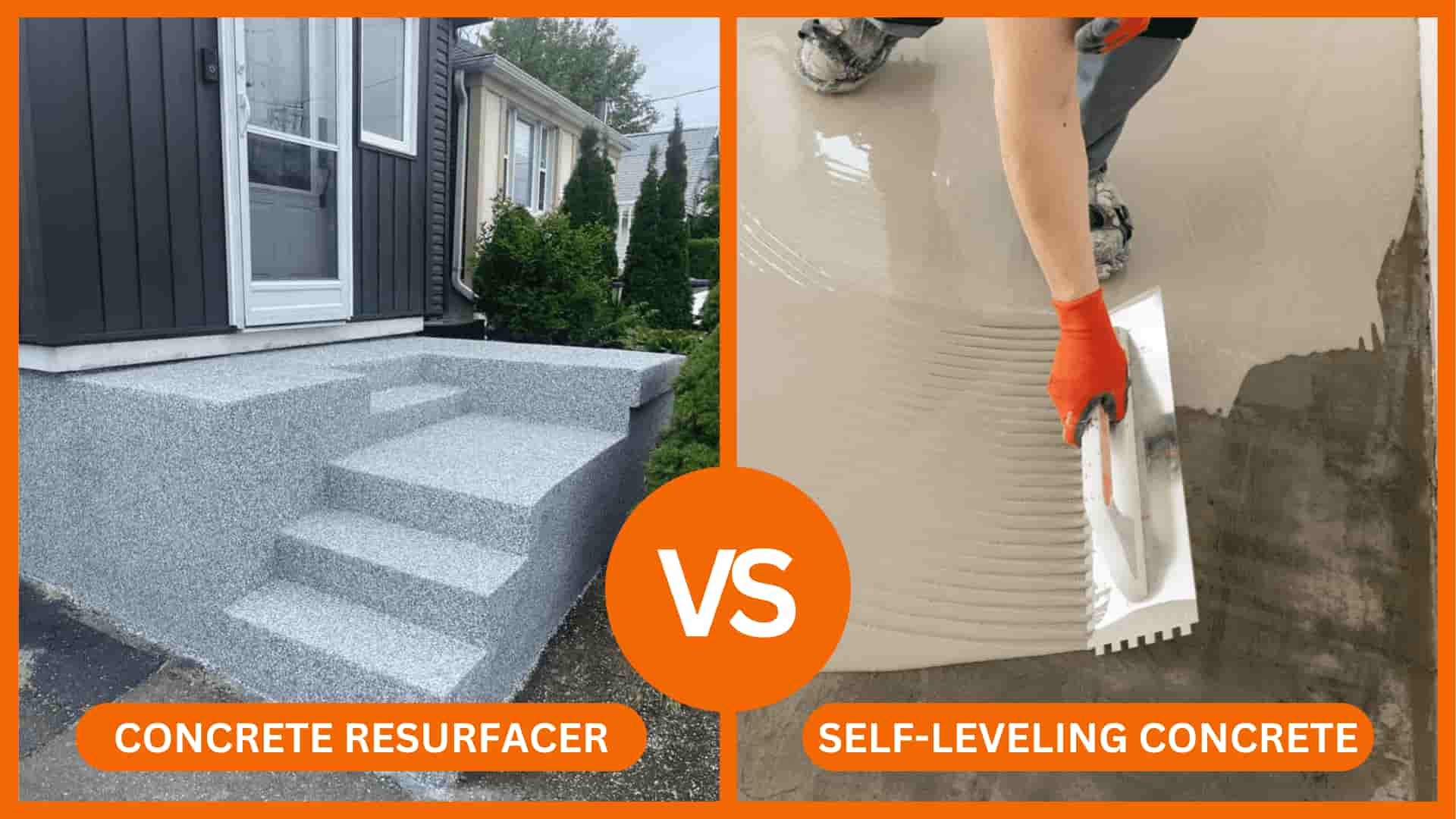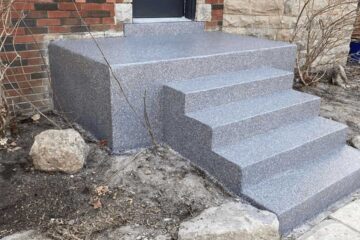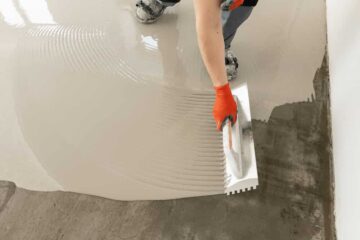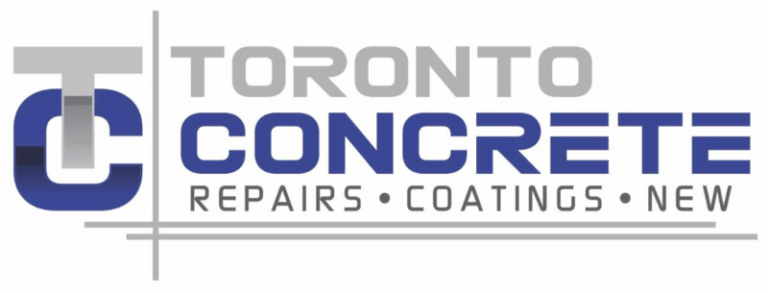You are Here: BLOG / CONCRETE RESURFACER VS SELF-LEVELING: WHICH ONE TO PICK?

CONCRETE RESURFACER VS SELF-LEVELING: WHICH ONE TO PICK?
By TorontoConcreteRepair on August 21, 2024
When it comes to renewing aged concrete surfaces, the right product choice is essential. Whether you’re dealing with surface imperfections like cracked slabs, uneven basement floors, or pitted driveways, both concrete resurfacers and self-leveling concrete compounds offer unique benefits.
But which one should you choose? This comprehensive guide delves into the differences, pros and cons, and best use cases for each, helping you make an informed decision.
Concrete resurfacing is a widely used repair method for restoring damaged surfaces. Rather than removing and replacing the entire slab, resurfacing involves applying a thin overlay to cover wear and tear.
This process is both cost-effective and time-saving, allowing for enhanced durability and aesthetic appeal without extensive demolition.
Concrete Resurfacer vs Self-Leveling Concrete
What is a Concrete Resurfacer?
A concrete resurfacer is a cementitious coating designed to rejuvenate weathered surfaces while filling minor cracks and imperfections. Commonly used for driveways, sidewalks, and patios, resurfacing is ideal for situations where the structural integrity of the slab remains intact. Concrete resurfacers often include additives for better adhesion, wear resistance, and freeze-thaw protection.
What is Self-Leveling Concrete?
Self-leveling concrete is a polymer-modified compound that flows to create a smooth and level surface without the need for extensive manual spreading. It’s primarily used as an underlayment for new flooring installations like tile, vinyl, or hardwood, especially in interior spaces. This product can also be utilized for basements, commercial areas, and places where surface evenness is critical.
Differences Between Concrete Resurfacer and Self-Leveling Concrete


Though both products are used for concrete restoration, they serve different purposes:
- Composition and Thickness: Concrete resurfacers are thinner and are meant to improve surface appearance. Self-leveling concrete, however, can be poured in layers up to 1 inch thick to correct significant unevenness.
- Application Areas: Resurfacers work best for outdoor settings, such as driveways and garages, while self-leveling compounds are tailored for indoor applications like basements and subfloors.
- Surface Preparation Requirements: Both products require careful preparation, including power washing, degreasing, crack filling, and, in some cases, acid etching for proper adhesion.
Concrete Resurfacer: Pros and Cons
Pros:
- Cost-Effective: A budget-friendly option for improving aesthetics and extending the life of outdoor surfaces.
- Decorative Finishes: Resurfacers can be tinted, stamped, or textured, offering plenty of design flexibility.
- Quick Installation: Simple and straightforward application that minimizes downtime.
Cons:
- Limited Repair Scope: Resurfacers are suitable for surface-level issues but won’t resolve deep cracks or structural problems.
- Shorter Lifespan: While durable, resurfaced areas may need reapplication after 8-15 years, depending on exposure and maintenance.
Self-Leveling Concrete: Pros and Cons
Pros:
- Even Surface: Perfect for creating a flat base for flooring installations, reducing the risk of uneven tiles or squeaky floors.
- High Durability: Resistant to wear, abrasion, and heavy foot traffic, making it a reliable choice for high-traffic commercial areas.
- Versatile Application: Can be applied over concrete, tile, and even wood, making it a go-to solution for tricky subfloors.
Cons:
- Higher Cost: The advanced composition and specialized application tools make it pricier than resurfacer alternatives.
- Primarily Functional: Unlike resurfacers, self-leveling concrete is designed more for functionality than aesthetic appeal.
Best Use Cases for Concrete Resurfacer
Concrete resurfacers are well-suited for outdoor repairs, particularly where surface renewal is the goal:
- Driveways and Sidewalks: Cover minor imperfections while enhancing curb appeal.
- Garage Floors: Improve durability with an optional slip-resistant finish.
- Patios and Walkways: Customize your outdoor space with decorative textures, colors, and designs.
Best Use Cases for Self-Leveling Concrete
Self-leveling concrete is ideal for interior applications requiring a perfectly smooth and level surface:
- Interior Floors and Basements: Prepare an even subfloor for subsequent flooring installations.
- Underlayment for Tile or Vinyl Flooring: Ensure consistent support and stability for floating floors.
- Commercial Settings: Achieve durable, professional finishes in offices, retail spaces, and more.
Application Process for Concrete Resurfacer
The resurfacing process is straightforward but requires attention to detail:
- Surface Preparation: Start by cleaning, degreasing, and repairing cracks. For heavily stained surfaces, consider acid etching.
- Mixing and Application: Follow the product’s guidelines for mixing. Use a squeegee or trowel to spread the resurfacer evenly.
- Curing and Sealing: Allow at least 24-48 hours for curing before applying any finishing sealants for additional protection.
Application Process for Self-Leveling Concrete
Self-leveling concrete demands precise handling:
- Surface Prep and Priming: Clean and prime the floor for enhanced adhesion and flow.
- Mixing and Pouring: Combine the compound following manufacturer instructions and pour directly onto the floor.
- Spreading and Leveling: Use a gauge rake or spiked roller to assist the leveling process, ensuring smooth coverage.
Cost Comparison Between Concrete Resurfacer and Self-Leveling Concrete
Resurfacers are more affordable, typically ranging from $5 to $10 per square foot, making them ideal for cosmetic outdoor upgrades. Self-leveling concrete, given its polymer additives and enhanced performance, costs between $5 to $12 per square foot.
The choice between the two should consider not just upfront costs, but also longevity, maintenance, and desired outcomes.
DIY vs. Hiring a Professional
While both processes can be DIY-friendly, there are complexities to consider:
- DIY Resurfacing: Manageable for smaller areas, but achieving consistent thickness and finish may require professional expertise.
- DIY Self-Leveling: The product’s flowability demands careful application; missteps can lead to uneven surfaces that are costly to repair.
Environmental Impact of Each Solution
Resurfacing and self-leveling solutions are generally eco-friendly, reducing the need for full slab replacements and minimizing waste. Both options have low VOC content, contributing to healthier indoor environments.
Additionally, some products incorporate recycled materials, enhancing their sustainability profile.
FAQs
Can self-leveling concrete be used outdoors?
Though it’s primarily designed for indoor use, there are specialized formulas suitable for exterior applications.
How thick can concrete resurfacer be applied?
Concrete resurfacers are typically applied at a thickness of 1/8 inch, but some products can accommodate slightly thicker layers.
Is self-leveling concrete appropriate for high-traffic areas?
Yes, it’s highly durable and works well in commercial settings or areas with heavy foot traffic.
How long does it take each product to fully cure?
Resurfaced concrete usually cures in 24-48 hours, while self-leveling concrete may cure in as little as 24 hours, depending on thickness and environmental conditions.
What’s the lifespan of resurfaced versus self-leveled concrete?
Resurfaced concrete generally lasts 8-15 years, while self-leveled concrete may have an extended lifespan due to its thicker, more robust properties.
Conclusion
Choosing between a concrete resurfacer and self-leveling concrete depends on the specific requirements of your project. Resurfacers excel in outdoor scenarios where visual enhancement is needed, while self-leveling concrete is unbeatable for creating smooth, even indoor floors ready for new coverings. By considering the product’s strengths, cost, and application context, you can make the right choice for your renovation goals.
Still if you have any confusion, or want to ask questions more about concrete resurfacer and self leveling concrete, you can contact us, we are happy to assist you anyhow. You can reach out to us over a phone call or from email or from our social media page.
